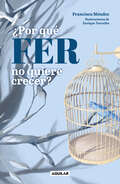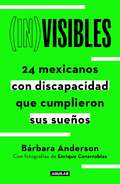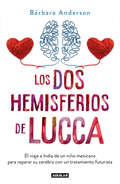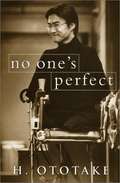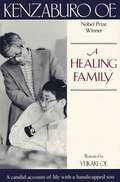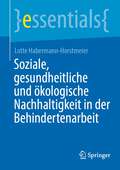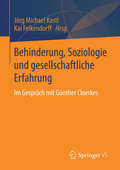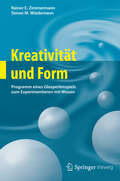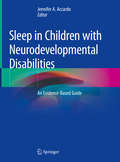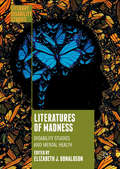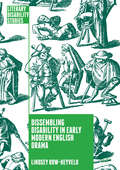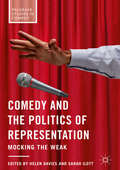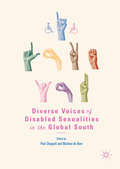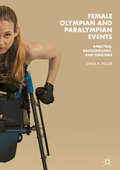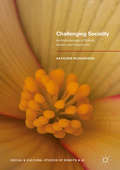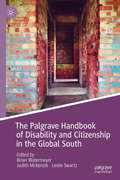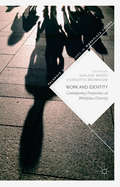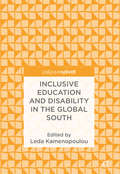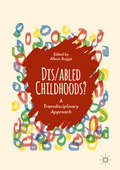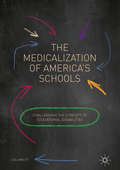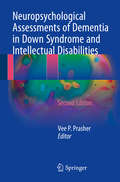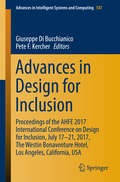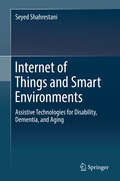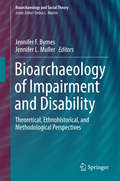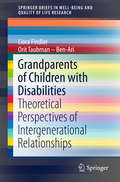- Table View
- List View
¿Por qué Fer no quiere crecer?
by Francisca MendezFer es un pez en el agua, Fer es un Niño con alas. A Fer le obsesionan la bola 8 y el gato Everest, las historias, los juegos y la ópera. El único enigma por resolver es, ¿por qué Fer no quiere crecer En un mosaico de memorias, Francisca Méndez intenta descifrar la mente de Fer, su hijo con autismo. Tomando prestada la voz de su otra hija, Francisquita, cuenta las desventuras convertidas en memorables anécdotas, los retos que presenta el día a día de una familia en esta condición y las batallas libradas que se traducen en lecciones de amor. En un acto de franca valentía, la autora enseña su lado más vulnerable con el único propósito de hacernos a todos un poco más sensibles y empáticos, volviendo su historia personal un faro para las personas que viven el autismo de primera mano y para las que nos hace falta verlo más de cerca.
(In)visibles
by Bárbara AndersonSi en México más del 16% de la población, cerca de 21 millones o 1 de cada 6 mexicanos cuentan con algún tipo de condición discapacitante, ¿por qué parece que son muchos menos los casos que conocemos? Porque las personas con discapacidad (pcd) en nuestro país son una fuerza invisible. Si no es cada cuatro años que se celebran los paralímpicos, si no se acerca el Día Internacional de las pcd, cuando las marcas realizan acciones; si no es que el gobierno da beneficios fiscales para impulsar la inserción laboral de este grupo, el resto del tiempo las personas con discapacidad viven entre las sombras. Este libro busca arrojar un poco de luz a apenas veinticuatro de esos millones que no vemos. Con discapacidades de nacimiento o adquiridas y de diversos tipos, y origen de varias partes del país, medallistas olímpicos, empresarios, filántropos, ejecutivos, políticos, servidores públicos, artistas, activistas, conferencistas, académicos, abogados, un médico y hasta un standupero cuentan por primera vez sus historias con resiliencia, valentía y un propósito: ser referentes para otras pcd y motivar a la población general a ser agentes de cambio, a contribuir en multiplicar esa luz y velar por la inclusión en todos los aspectos de la vida. Un libro desgarrado, inspirador y sui géneris en el que la periodista y activista Bárbara Anderson presta su pluma para dar voz a quienes no cuentan, al tiempo que el reconocido fotógrafo Enrique Covarrubias ilumina sus rostros por primera vez con una mirada entre iguales. Invisibles es una lectura que cambia radicalmente la manera en la que vemos la discapacidad, mueve conciencias e invita a la acción.
Los dos hemisferios de Lucca
by Bárbara AndersonEl viaje a India de un niño mexicano para reparar su cerebro con un tratamiento futurista. Bárbara Anderson narra con brutal franqueza el día a día de tener un hijo con discapacidad: los retos dentro y fuera de casa, las complicaciones de salud y de vida; los cambios de prioridades; el Everest de cada día al tener un hijo con -hasta ahora- un diagnóstico irreversible como es la parálisis cerebral infantil. La autora detalla cómo emprende un viaje a India con toda su familia para que Lucca sea uno de los primeros niños en someterse a un tratamiento de 28 días, dos ocasiones durante 2017 y otra en 2019, y los asombrosos resultados que vieron en él: una neurogénesis que arranca con el Cytotron, aparato creado por el científico indio Rajah Kumar. Como buen viaje de todo héroe, la historia no termina ahí: Bárbara, a quien no le gusta aceptar un no por respuesta, se embarca en una lucha para lograr impulsar el uso del Cytotron en México. Un vistazo a las posibilidades que se abren desde ahora para pacientes con parálisis cerebral y otras condiciones neurológicas además de otro tipo de enfermedades como el cáncer desde México, el punto más lejano en el mundo a Bangalore. "Un libro estremecedor, hermoso, y últimamente esperanzador. Los dos hemisferios de Lucca es la prueba de que la perseverancia y el empeño siempre tienen su recompensa, y de que el Cytotron marcará un cambio de paradigma para millones de personas a nivel mundial que sufren problemas de salud hasta ahora intratables. Una joya de historia." -Michael Rowe, director de cine.
No One's Perfect
by Hirotada Ototake Gerry HarcourtMemoir of a young Japanese man born with no arms or legs.
A Healing Family: A Candid Account of Life with a Handicapped Son
by Kenzaburo Oë Stephen SnyderA Healing Family, Kenzaburo Oë's first book since winning the Nobel Prize for Literature, is an intimate portrait of the people closest to him. Above all, it is about his son Hikari. Hikari was born in 1963 with a growth on his brain so large it made him look as if he had two heads. His parents were told he might never be more than a "human vegetable" requiring constant care; but they took the decision to raise him. Today, despite autism, poor vision, and a tendency to seizures, their son is an established composer with two successful CDs to his credit. Oë has often written about the sorrows and satisfactions of being the parent of a handicapped child, most memorably in A Personal Matter; but nowhere has his writing been more personal, more buoyant, more revealing than in this non-fiction work. Without diminishing the suffering that Hikari and his family have been through, he celebrates the victories that can be won, especially his son's gift for music--his own "language." Friends make an appearance along the way--doctors, musicians, other writers--as do the themes that have preoccupied Oë all his life: the rights of the underprivileged; the moral authority of the survivors of the atomic bombing; the mystery of language. But his thoughts keep circling back to his family--to the healing power of the family, and the unwitting courage we can all find in ourselves.
Soziale, gesundheitliche und ökologische Nachhaltigkeit in der Behindertenarbeit (essentials)
by Lotte Habermann-HorstmeierUm Menschen mit geistiger Behinderung ein nachhaltiges, gesundes Leben zu ermöglichen, braucht es eine nachhaltig gesundheitsfördernde Lebenswelt, die in ein gesundes Ökosystem eingebettet ist, sowie eine sie tragende Gesellschaft, die das Wohl aller Menschen und die Unversehrtheit ihrer natürlichen Umwelt im Blick hat.
Behinderung, Soziologie und gesellschaftliche Erfahrung: Im Gespräch mit Günther Cloerkes
by Jörg Michael Kastl Kai FelkendorffGünther Cloerkes ist einer der wichtigsten europäischen Vertreter einer interaktionistischen Soziologie der Behinderten. Im Zentrum des Bandes stehen Gespräche und Interviews, die Kai Felkendorff und Jörg Michael Kastl mit ihm in den Jahren 2009-2013 geführt haben. Sie werden ergänzt durch Aufsätze von Günther Cloerkes und Jörg Michael Kastl, die historische und systematische Aspekte einer sozial engagierten Soziologie der Behinderten und der Behinderung beleuchten.
Kreativität und Form
by Simon M. Wiedemann Rainer E. ZimmermannAusgehend von der Idee des Glasperlenspiels, die Hermann Hesse in seinem gleichnamigen Roman entwirft, haben die Autoren in diesem Band die Möglichkeiten und Grenzen eines solchen Spiels im Umgang mit Wissen ausgelotet. Sie zeigen neue Methoden für das Wissensmanagement auf und verbinden dafür Erkenntnisse verschiedener Wissenschaftsgebiete wie Logik, System- und Erkenntnistheorie sowie Semiotik, Kognition und Kommunikation. Das begleitende Computerprogramm unterstützt Leser beim Experimentieren mit Wissen.
Sleep in Children with Neurodevelopmental Disabilities: An Evidence-Based Guide
by Jennifer A. AccardoThis practical guide presents approaches to working with children and adolescents with neurodevelopmental disabilities who have sleep problems. Divided into four sections, the book begins with the impact of sleep problems in children with disabilities and the evaluation of sleep complaints. The next two sections cover the major categories of sleep disorders as they apply in children with disabilities, and specific neurodevelopmental disabilities with their characteristic sleep manifestations. The last section details options for treatment, which include behavioral and environmental strategies, occupational therapy, exercise, and medications. Chapters feature case studies that introduce and reinforce diagnostic and therapeutic approaches. Those engaged in the care of children with neurodevelopmental disabilities and sleep problems will find this text to be an invaluable guide when assessing and treating sleep disorders.
Literatures of Madness: Disability Studies and Mental Health (Literary Disability Studies)
by Elizabeth J. DonaldsonLiteratures of Madness: Disability Studies and Mental Health brings together scholars working in disability studies, mad studies, feminist theory, Indigenous studies, postcolonial theory, Jewish literature, queer studies, American studies, trauma studies, and comics to create an intersectional community of scholarship in literary disability studies of mental health. The collection contains essays on canonical authors and lesser known and sometimes forgotten writers, including Sylvia Plath, Louisa May Alcott, Hannah Weiner, Mary Jane Ward, Michelle Cliff, Lee Maracle, Joanne Greenberg, Ann Bannon, Jerry Pinto, Persimmon Blackbridge, and others. The volume addresses the under-representation of madness and psychiatric disability in the field of disability studies, which traditionally focuses on physical disability, and explores the controversies and the common ground among disability studies, anti-psychiatric discourses, mad studies, graphic medicine, and health/medical humanities.
Dissembling Disability in Early Modern English Drama (Literary Disability Studies)
by Lindsey Row-HeyveldWhy do able-bodied characters fake disability in 40 early modern English plays? This book uncovers a previously unexamined theatrical tradition and explores the way counterfeit disability captivated the Renaissance stage. Through detailed case studies of both lesser-known and canonical plays (by Shakespeare, Jonson, Marston, and others), Lindsey Row-Heyveld demonstrates why counterfeit disability proved so useful to early modern playwrights. Changing approaches to almsgiving in the English Reformation led to increasing concerns about feigned disability. The theater capitalized on those concerns, using the counterfeit-disability tradition to explore issues of charity, epistemology, and spectatorship. By illuminating this neglected tradition, this book fills an important gap in both disability history and literary studies, and explores how fears of counterfeit disability created a feedback loop of performance and suspicion. The result is the still-pervasive insistence that even genuinely disabled people must perform in order to, paradoxically, prove the authenticity of their impairments.
Comedy and the Politics of Representation: Mocking the Weak (Palgrave Studies in Comedy)
by Helen Davies Sarah IlottThis edited collection explores the representations of identity in comedy and interrogates the ways in which “humorous” constructions of gender, sexuality, ethnicity, religion, class and disability raise serious issues about privilege, agency and oppression in popular culture. Should there be limits to free speech when humour is aimed at marginalised social groups? What are the limits of free speech when comedy pokes fun at those who hold social power? Can taboo joking be used towards politically progressive ends? Can stereotypes be mocked through their re-invocation? Comedy and the Politics of Representation: Mocking the Weak breaks new theoretical ground by demonstrating how the way people are represented mediates the triadic relationship set up in comedy between teller, audience and butt of the joke. By bringing together a selection of essays from international scholars, this study unpacks and examines the dynamic role that humour plays in making and remaking identity and power relations in culture and society.
Diverse Voices of Disabled Sexualities in the Global South
by Marlene De Beer Paul ChappellThis volume aims to critically engage with constructs and experiences of disabled sexualities through Africa, Asia, Latin America and the Caribbean. In doing so, it is hoped that the questions raised, relfections, analyses and arguments will provide readers with a catalyst through which to (re)think disabled sexualities from the perspective of the Global South. What makes this edited volume unique is besides chapters from emerging academics and disability activists who either live or work in the Global South, it also includes personal contributions from disabled people across the Global South. This volume takes a broad perspective on disabled sexualities addressing such areas as gender, race, culture, colonialism, body image, sexual pleasure, sexuality education, sexual access, sexual and reproductive health services, queer sexualities, and sexual rights and justice. The volume will be of interest to international and national organisations for people with disabilities, gender and sexuality researchers, health professionals, social workers, academics and students at all higher education and training institutions interested in disability, gender queer and sexuality studies.
Female Olympian and Paralympian Events: Analyses, Backgrounds, and Timelines
by Linda K. FullerFemale Olympian and Paralympian Events is a groundbreaking book that examines women’s sports in the Olympic and Paralympic Games, which have long been underappreciated and under-analyzed. The book begins with a brief background on women’s participation in the Olympic Games and their role relative to the International Olympic Committee, then introduces the underlying Gendered Critical Discourse Analysis theory used throughout the book’s analysis before delving into a literature review of female Olympians and Paralympians’ events. It includes a listing of noteworthy “firsts” in the field, followed by individual discussions of twenty-eight Summer and seven Winter events, analyzed according to their historical, rhetorical, and popular cultural representations. Women’s unique role(s) in the various events are discussed, particular athletes and Paralympic events are highlighted, and original tables are also included. At the end of each section, affiliated organizations and resources are included in this invaluable referential volume.
Challenging Sociality: An Anthropology Of Robots, Autism, And Attachment (Social And Cultural Studies Of Robots And Ai Ser.)
by Kathleen RichardsonThis book explores the development of humanoid robots for helping children with autism develop social skills based on fieldwork in the UK and the USA. Robotic scientists propose that robots can therapeutically help children with autism because there is a “special” affinity between them and mechanical things. This idea is supported by autism experts that claim those with autism have a preference for things over other persons. Autism is also seen as a gendered condition, with men considered less social and therefore more likely to have the condition. The author explores how these experiments in cultivating social skills in children with autism using robots, while focused on a unique subsection, is the model for a new kind of human-thing relationship for wider society across the capitalist world where machines can take on the role of the “you” in the relational encounter. Moreover, underscoring this is a form of consciousness that arises out of specific forms of attachment styles.
The Palgrave Handbook of Disability and Citizenship in the Global South (Palgrave Studies in Disability and International Development)
by Leslie Swartz Brian Watermeyer Judith McKenzieThis handbook questions, debates and subverts commonly held assumptions about disability and citizenship in the global postcolonial context. Discourses of citizenship and human rights, so elemental to strategies for addressing disability-based inequality in wealthier nations, have vastly different ramifications in societies of the Global South, where resources for development are limited, democratic processes may be uncertain, and access to education, health, transport and other key services cannot be taken for granted. In a broad range of areas relevant to disability equity and transformation, an eclectic group of contributors critically consider whether, when and how citizenship may be used as a lever of change in circumstances far removed from UN boardrooms in New York or Geneva. Debate is polyvocal, with voices from the South engaging with those from the North, disabled people with nondisabled, and activists and politicians intersecting with researchers and theoreticians. Along the way, accepted wisdoms on a host of issues in disability and international development are enriched and problematized. The volume explores what life for disabled people in low and middle income countries tells us about subjects such as identity and intersectionality, labour and the global market, family life and intimate relationships, migration, climate change, access to the digital world, participation in sport and the performing arts, and much else.
Work and Identity: Contemporary Perspectives On Workplace Diversity (Palgrave Explorations In Workplace Stigma Ser.)
by Shalene Werth Charlotte BrownlowThis edited volume highlights relevant issues and solutions for diversity groups within the workplace. It explores issues of identity as they relate to attributes of gender, age, migrant labor, disability, and power in social spaces. Identity is rarely well-defined in many social spaces, and understandings that define belonging are often developed through the normative expectations of others. Having an evidence-based approach in addressing these relevant issues, this book will appeal to academics and practitioners alike looking for practical and theoretical solutions to improving the situations of these groups in paid employment.
Inclusive Education and Disability in the Global South
by Leda KamenopoulouThis edited volume examines inclusive education and disability in the global South. Presenting four qualitative research studies conducted in Malaysia, Bhutan, Philippines and Belize, the authors examine the implementation of inclusive education and disabled children’s participation in the education system: contexts on which very little is known. Thus, this book provides a unique opportunity to access rare context-specific information concerning this region of the world; and to reflect on the particular challenges some countries face in the realization of full participation of all children within education. Authored by researchers who are also teaching professionals with experience and understanding of the complexities of the real world, this book reminds us that researchers and policy makers must listen to all voices and perspectives: especially those that have remained silenced and ignored.
Dis/abled Childhoods?
by Allison BoggisThis edited collection explores the intersectionality of childhood and disability. Whereas available scholarship tends to concentrate on care-giving, parenting, or supporting and teaching children and young people with special educational needs and disabilities, the contributors to this collection offer an engaging and accessible insight into childhoods that are impacted by disability and impairment. The discussions cut across traditional disciplinary divides and offer critical insights into the key issues that relate to disabled children and young people's lives, encouraging the exploration of both disability and childhoods in their broadest terms. Dis/abled Childhoods? will be of interest to students and scholars across a range of disciplines including Special Educational Needs; Childhood Studies; Disability Studies; Youth Studies; and Health and Social Care.
The Medicalization of America's Schools
by Joel MachtThis book challenges the validity of ADHD, learning disabilities, and dyslexia as meaningful special education "categories" and critically examines the misplaced medical model from which they are derived. The presumption that these disabilities cause school-related problems detracts from identifying factors within the classroom that create and maintain a child's underachievement and disruptive behavior. Moreover, when the disability is finally named, it provides no functional information that translates into effective coping strategies. Macht delves into the misunderstood structure of these disabilities, pointing out that they are not verifiable disabilities but weak constructs that poorly describe each child's uniqueness. Finally, he provides an alternative model based on children's strengths rather than their deficiencies, and presents strategies that advance school-related success.
Neuropsychological Assessments of Dementia in Down Syndrome and Intellectual Disabilities
by Vee P. PrasherUp to the early 1980s neuropsychological assessments of persons with intellectual disability (ID) usually meant an assessment for developmental delay, of intelligence (intelligence quotient testing) or of level of adaptive behavior. Popular tests included the Stanford-Binet, Wechsler Intelligence Scales, Bayley Scales of Infant Development, the Griffin Mental Developmental Scales, and the Vineland Social Maturity Scale. These were assessments of the "overall" level of ability. Arthur Dalton in New York was one of a few pioneering clinicians who at this time, focused on the development of tests for specific areas of cognition in persons with ID. Following his work, sub- quent researchers, in the latter part of the twentieth century, have proposed and dev- oped a number of measures not only to detect the level of cognitive abilities but also to measure decline; a perquisite to the diagnosis of dementia. At the beginning of the twenty-first century as demonstrated in this book, several neuropsychological measures have been developed to aid the clinical diagnosis of dementia/dementia in Alzheimer's disease (AD). Neuropsychological assessments no longer remain the sole responsibility of psychologists, as psychiatrists, resear- ers, ID nurses, neuroscientists, all now play a part in the development and adm- istration of specific tests.
Advances in Design for Inclusion: Proceedings of the AHFE 2017 International Conference on Design for Inclusion, July 17–21, 2017, The Westin Bonaventure Hotel, Los Angeles, California, USA (Advances in Intelligent Systems and Computing #587)
by Giuseppe Di Bucchianico Pete F KercherThis book focuses on a range of topics in design, such as universal design, design for all, digital inclusion, universal usability, and accessibility of technologies independently of people s age, economic situation, education, geographic location, culture and language. It especially focuses on accessibility for people with auditory, cognitive, neurological, and visual impairments, ageing populations, and mobility for physical special needs. The book explores some of the overlaps between inclusive design and web accessibility to help managers, designers, developers, policy makers, and researchers optimize their efforts in these overlapping areas. Based on the AHFE 2016 International Conference on Design for Inclusion, held on July 27-31, 2016, in Walt Disney World(r), Florida, USA, this book discusses new design technologies, highlighting various requirements of individuals within a community. Thanks to its multidisciplinary approach, the book represents a useful resource for readers with different kinds of backgrounds and provides them with a timely, practice-oriented guide to design for inclusion. "
Internet of Things and Smart Environments
by Seyed ShahrestaniThis book is focused on the Internet of Things (IoT) services and smart environments that can be of assistance to the elderly and individuals living with dementia or some sensory impairment. The book outlines the requirements of the systems that aim to furnish some digital sensory or cognitive assistance to the individuals and their caregivers. Internet of Things and Smart Environments: Assistive Technologies for Disability, Dementia, and Aging covers the important evolutions of the IoT, the sensors, actuators, wireless communication and pervasive computing systems, and other enabling technologies that power up this megatrend infrastructure. The use of the IoT-based systems in improving the conventional assistive technologies and provisions of ambient assisted living are also covered. The book takes an impartial, and yet holistic, view to providing research insights and inspirations for more development works in the areas related to assistive IoT. It will show the potentials of using normally available interactive devices, like smartphones or smart TVs, which can be supplemented with low-cost gadgets or apps to provide assistive capabilities. It aims to accentuate the need for taking a comprehensive and combinatory view of the comprising topics and approaches that are based on the visions and ideas from all stakeholders. The book will examine these points and considerations to conclude with recommendations for future development works and research directions. This book can be of value to a diverse array of audience. The researchers and developers in healthcare and medicine, aged care and disability services, as well as those working in the IoT-related fields, may find many parts of this book useful and stimulating. It can be of great value to postgraduate and research students working in these areas. It can also be adapted for use in upper-level classroom courses relevant to communication and smart technologies, IoT applications, and assistive technologies. Many parts of the book can be of interest to the elderly and individuals living with a disability, as well as their families and caregivers. From an industry perspective, it can be of interest to software, hardware, and particularly app developers working on the IoT applications, smart homes and environments, and assistive technologies for the elderly and people living with disability or dementia.
Bioarchaeology of Impairment and Disability: Theoretical, Ethnohistorical, and Methodological Perspectives (Bioarchaeology and Social Theory)
by Jennifer F. Byrnes Jennifer L. MullerOver the years, impairment has been discussed in bioarchaeology, with some scholars providing carefully contextualized explanations for their causes and consequences. Such investigations typically take a case study approach and focus on the functional aspects of impairments. However, these interpretations are disconnected from disability theory discourse. Other social sciences and the humanities have far surpassed most of anthropology (with the exception of medical anthropology) in their integration of social theories of disability. This volume has three goals: The first goal of this edited volume is to present theoretical and methodological discussions on impairment and disability. The second goal of this volume is to emphasize the necessity of interdisciplinarity in discussions of impairment and disability within bioarchaeology. The third goal of the volume is to present various methodological approaches to quantifying impairment in skeletonized and mummified remains.
Grandparents of Children with Disabilities
by Liora Findler Orit Taubman – Ben-AriThis briefs offers a comprehensive view of the journey of grandparents of children with disabilities by employing a wide range of theoretical approaches such as intergenerational relationships, positive psychology, psychoanalytic views and models of stress. It presents a multidimensional view of grandparents, which begins with the general role of grandparents in the family and the transition to grandparenthood, as a major life event. The briefs moves on to discuss grandparents' roles under unique circumstances such as illness or disability in the family and then deals with perspectives of parents of children with disabilities on the role of grandparents. Finally, it reviews attitudes of professionals toward grandparents and concludes with suggested intervention strategies for working with families on intergenerational relationships.
